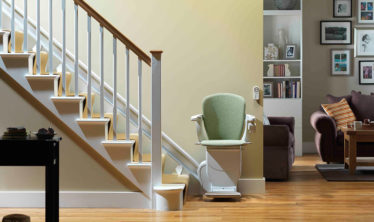All the stairlift dimensions you need to know about to install a stairlift at home
Written by stannah
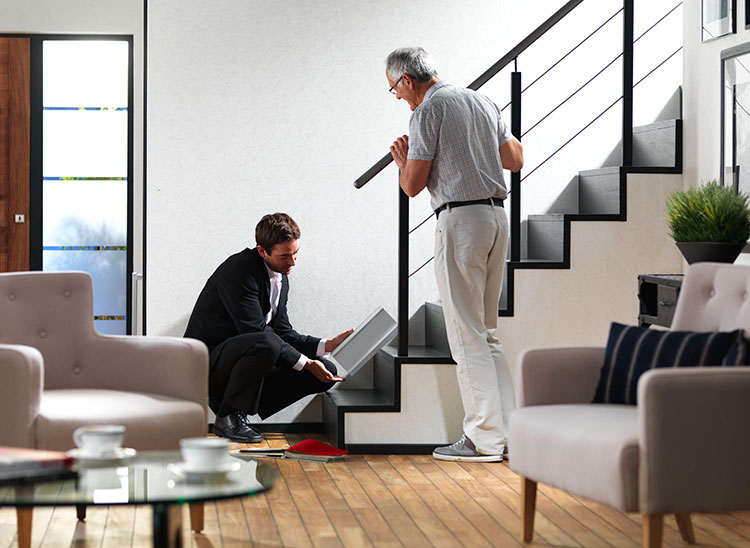
Have you ever thought about installing a stairlift in your home, but had no idea if it would fit your stairs because you didn’t know the stairlift’s dimensions? Many of our customers have gone through the exact same thing.
At Stannah, we have several stairlift models with different dimensions to fit your stairs, as well as various customisation options.
Because no two homes are the same and staircases can have different shapes, our stairlifts are highly customisable and safe, making the best use of the available space and ensuring maximum safety for everyone – those using the stairlift and those that prefer to use the stairs.
To help you out, we’ve gathered the main key points that you should look for in a stairlift: dimensions, how it works, customisation options, and installation details.
Stairlift Dimensions: do stairlifts have different dimensions?
Stairlifts can vary in size depending on the model. Depending on whether the staircase is curved or straight, the type of staircase they’re installed on will also influence the rail measurement.
Straight Stairlifts Dimensions
Straight stairlifts are installed on straight staircases, connecting one floor to another. Usually, the chair is parked at the bottom or top of the stairs.
The rail is installed along the staircase on which the chair will travel. The rail itself takes up only 15 cm on the stairs, so it won’t bother the people who wish to use the stairs on foot.
Another important aspect to bear in mind is that the rail will stick out past the bottom step by about 45.7 cm. This extra space is essential so that the stairlift can be parked safely.
So, if you have a narrow hallway or a doorway near the last step of your stairs, you should consider other features such as a retractable rail or a rail that bends around the wall or bannister.
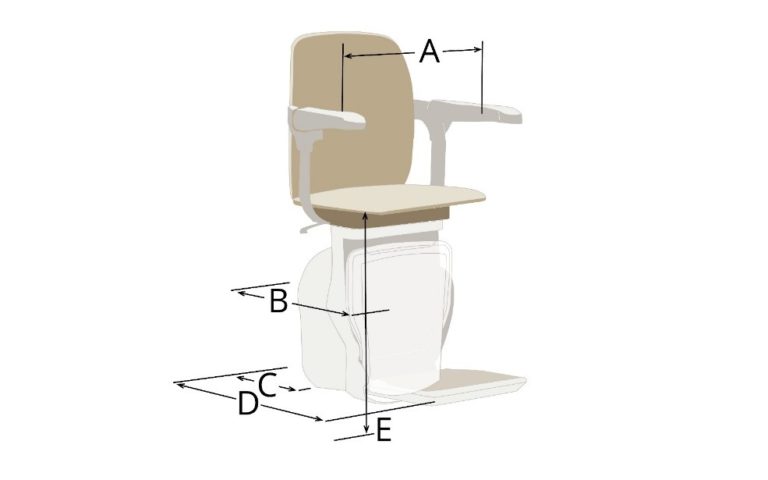
| A | Chair width (inside of armrests) | 48.2 cm |
| B | Depth from wall to footrest (folded) | 34.4 cm |
| C | Rail to wall (outside edge of rail) | 15 cm |
| D | Depth from wall to footrest (unfolded) | 65.9 cm |
| E | Seat height (adjusted at installation) | 39 cm to 49 cm |
| Minimum stair width | 67.9 cm |
Model: Siena 600
Curved Stairlift Dimensions
Curved stairlifts are installed on curved or spiral staircases with bends, turns or intermediate landings. The chair lift may turn and bend around a wall or bannister, keeping the stairs available for anyone who wishes to use it.
The metal rail is always made to measure, considering the staircase’s bends and turns. The rail will be 15 cm from the wall in straight sections of the curved stairs, just like the rail of a straight staircase.
Yet, it’s difficult to say how much space the rail may take up on the stairs because it will depend on the staircase’s design.
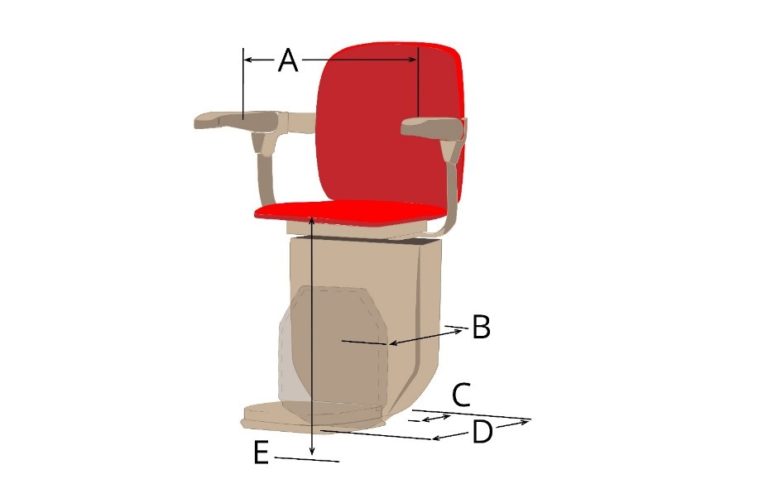
| A | Chair width (inside of armrests) | 48.2 cm |
| B | Depth from wall (folded) | 40.5 cm (depending on rail start position) |
| C | Rail to wall (outside edge of rail) | 15.2 cm* |
| D | Distance from wall to footrest (open) | 67.9 cm* |
| E | Height from footrest to seat (not adjustable) | 47 cm |
| Minimum staircase width | 67.9 cm* |
* may vary depending on configuration.
Model: Siena 260
Outdoor Stairlift Dimensions
Outdoor stairlifts are installed on straight stairways and usually include a safety key to prevent other people from being able to use the stairlift without your permission.
The stairlift and the outdoor rail are also prepared to withstand the wear and tear that results from temperature differences, including exposure to cold, rain, humidity and heat.
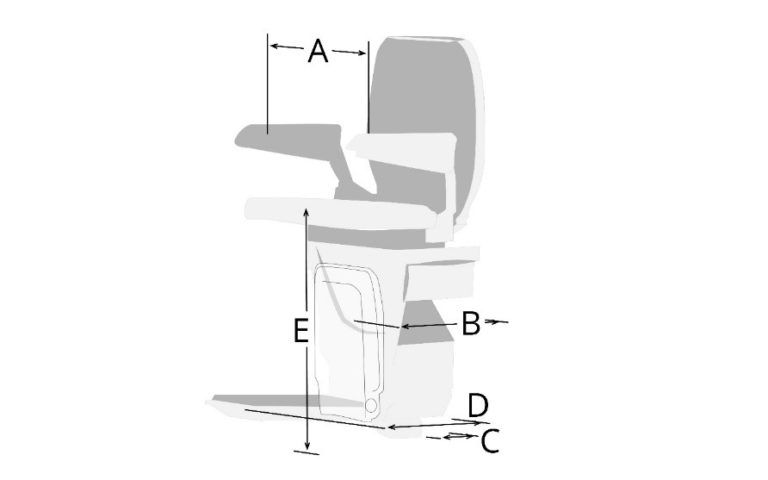
| A | Width of the chair (from armrest) | 47.9 cm |
| B | Distance from wall (closed) | 33.3 cm |
| C | Distance between wall and outside edge of rail | 20 cm |
| D | Distance from wall (open) | 64.7 cm |
| E | Height from footrest to seat (adjustable) | 48.5 cm to 53.5 cm |
| Minimum ladder width | 66.8 cm |
Model: Outdoor 320
Stairlift minimum width: the space you need for the installation
As well as knowing the stairlifts’ dimensions in general, it’s important to know how wide each one is.
The width of a stairlift varies depending on the model. It can range from approximately 64 cm to 77 cm (with the seat unfolded). The space required to install a stairlift is usually wider than the width of the stairlift itself.
When choosing a stairlift for your home, it’s important to ensure that you have the minimum required space available.
| Stairlift type | Minimum stairlift width |
| Straight stairlift | 67.9 cm |
| Curved stairlift | 67.9 cm* |
| Outdoor stairlift | 66.8 cm |
* may vary depending on the configuration.
Over the years, the design of Stannah stairlifts has been assessed and tested to ensure greater stability, safety and comfort for their users, but without ever forgetting its stylish features.
How to measure your stairs to know if you can install a stairlift
For an accurate assessment and expert advice on the most suitable stairlift for your home, you can request a visit from a Stannah mobility expert.
Our mobility experts assess your stairs and help you understand the space requirements that may impact a stairlift’s flawless installation and future operation.
The space measurement process has several steps:
1. Choosing the right stairlift
To decide which type of stairlift is right for you, our mobility expert assesses your stairs to decide on the best option – a straight or curved stairlift.
2. Measuring the staircase’s size
The size of the staircase can influence several aspects of a stairlift, from the size of the rail to how long it will take the chair to travel the distance between the bottom and top floor.
3. Measuring the width of the staircase
You need to ensure that the staircase has the minimum width required for you to install a chair lift. At this stage, you may be advised to remove some elements that take too much space, such as furniture or wall frames.
4. Measuring the headroom at the top of the stairs
Our mobility experts assess the headroom available at the top of the stairs, ensuring that there will be enough space to safely enter and exit the stairlift.
5. Measuring the space available on the landings
You need to have enough space for the rail so that you can park the chair and get in and out safely.
The rail can either be placed parallel to the steps or make a turn to park. This means that, depending on the situation, you can consider installing a retractable rail to prevent the rail from becoming a tripping hazard in a passageway.
Another option includes extending the rail to bend around the wall or a bannister. Thus, the stairlift is parked in a completely safe place.
Other frequently asked questions about Stannah stairlifts
What is a stairlift?
Stairlifts, also known as chair lifts, are motorised chairs that travel on a rail. This rail is always safely attached to the steps of the staircase.
Although stairlifts are used to transport people from one floor to another, they are different from platform lifts and home lifts. Stairlifts only transport one person at a time, without a wheelchair, from one floor to the next.
Can stairlifts be installed on any type of staircase?
Yes, stairlifts are custom built for the space in which they are to be installed, taking into account the staircase’s measurements and configuration.
How long does it take to install a stairlift?
Under normal circumstances, installing a stairlift takes less than a day. All our lifts are manufactured in our UK factory under high quality and safety standards.
What is a stairlift’s maximum weight capacity?
Our stairlifts can carry more or less weight, depending on the model. Generally, straight stairlifts carry up to 160Kg, and curved and external stairlifts carry up to 135Kg.
If you’d like to learn more about our measurement process, you can find additional information here.
How fast does a stairlift travel?
All our stairlift models travel at a speed of 0.09 metres per second. So, travelling up a 5-metre long staircase will take around 50 seconds.
What are the necessary electrical requirements to install a stair lift?
Whether on curved or straight stairs, indoors or outdoors, stairlifts are battery operated. The batteries must also be charged through a standard outlet.
The batteries are charged by a regular 110-Volt outlet, near the top or bottom of the stairs. In the case of an outdoor stairlift, you will still need access to an indoor outlet, nearby.
The appropriate outlet is usually chosen during a free stair survey, so you don’t have to worry about that, until someone comes to see your stairs. If you’re concerned about your electric bill, don’t be. The stairlift uses about as much electricity as your coffee pot.
How to install a stairlift?
Our technical team fixes the rail to the stair treads and installs the chair, charging system, and other stairlift components. Our technician will then test the stairlift before leaving your home.
What types of stairlifts are there, and where can they be installed?
There are different types of stairlifts, stairlifts for straight, curved and outdoor stairs. The former is used for straight staircases; the latter is used for spiral staircases or those with intermediate landings. The outdoor stairlifts are used in public or outdoor spaces.
Why invest in a stairlift?
Stairlifts are a safe and practical mobility solution because they are easy to install and adjust to almost any staircase design. The incredible work behind Stannah stairlifts ensures that each unit is crafted with precision and care, making them comfortable, safe, and very easy to use. People who wish to use the stairs can still do it and they don’t require extensive building work.
Next steps
Now that you know the potential of our stairlifts, it’s time to take another step. Get to know each of the models available, learn more about our purchasing process and request a free, no-obligation quote.
We understand that information is essential to making the right decision, and nobody is better prepared than our mobility experts to answer all your questions. Get in touch with us and we’ll gladly answer any questions you may have.


